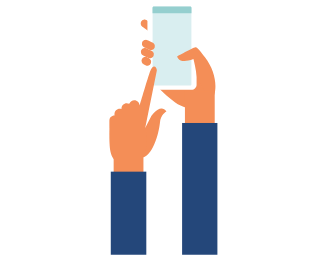Become a befriender
Have you recovered from an eating disorder, and would like to help someone else on their path to recovery? Why not volunteer to become a befriender?
Befriending is a voluntary, mutually beneficial relationship in which a befriender gives time to support and encourage someone. It differs from a friendship because the befriender is trained to offer a form of guided support as well as enabling the befriendee to find help with some of their feelings; often fear, anxiety, stress. Befriending helps them to feel less alone and isolated and encourages them make small positive changes towards recovery, including eating well again.
How befriending works
When you are trying to recover from an eating disorder it’s often hard to believe that you will ever get through it. The negative feelings and disordered thought patterns are difficult to challenge, and you might feel that they will always be there. Whilst support from family and friends is an important part of recovery, sometimes it can feel difficult to share the challenges you’re experiencing with those close to you. Does this sounds familiar? At times like this it can be really helpful to be able to talk to someone who truly knows what it’s like to be working towards recovery.
As a befriender, we would connect you with someone who is struggling to overcome an eating disorder so that a supportive relationship can form to help them along their journey to recovery. The befriending service is designed for people in the earlier stages of an eating disorder, who are ready to actively work on recovery, or those who may have struggled for longer but have engaged with professional treatment and are now emerging into a new, positive phase.
Why do we ask that you have been recovered for two years?
We have a duty of care to all of our valued volunteers and we need to ensure that you are well enough to support someone without damaging your own recovery or putting a befriendee at risk.
Please do be honest about your own recovery when you apply. Applications will be followed up by our befriending co-ordinator. If we don’t feel that becoming a befriender would be right for you at the moment we may ask you to wait a while before applying to us again.
Befriending is not a counselling service or therapy, and you would not be acting in a professional capacity. As a befriender you would support someone’s journey through email, phone or video call, by:
- actively listening, and offering real hope and encouragement from a place of empathy and understanding
- providing practical guidance and coping strategies to help them manage fear and anxieties related to food and eating
- helping them to make small, positive changes towards recovery, including eating well again
I’m interested, what’s next?
If you would like to apply to volunteer as a befriender, please complete our application form to tell us about yourself. When we receive your application, our befriending co-ordinator will arrange a chat with you to tell you more about the service.
If you are happy to proceed, you will be invited to befriender training which will cover everything you need to know about being a befriender.
For more information about deadlines and training, visit the First Steps ED website.
Apply to volunteer as a befriender
Please note that applications are currently paused until the summer.
Q&A with a Talk ED Befriender
Sarah’s Story: How befriending helped me during my recovery from bulimia
Are you worried that you, or a loved one may have an eating disorder? Our Peer Support Team have lived experiences of eating disorders and recovery.
To talk to someone who understands, book a 1:1 support call, we’re here to help.
